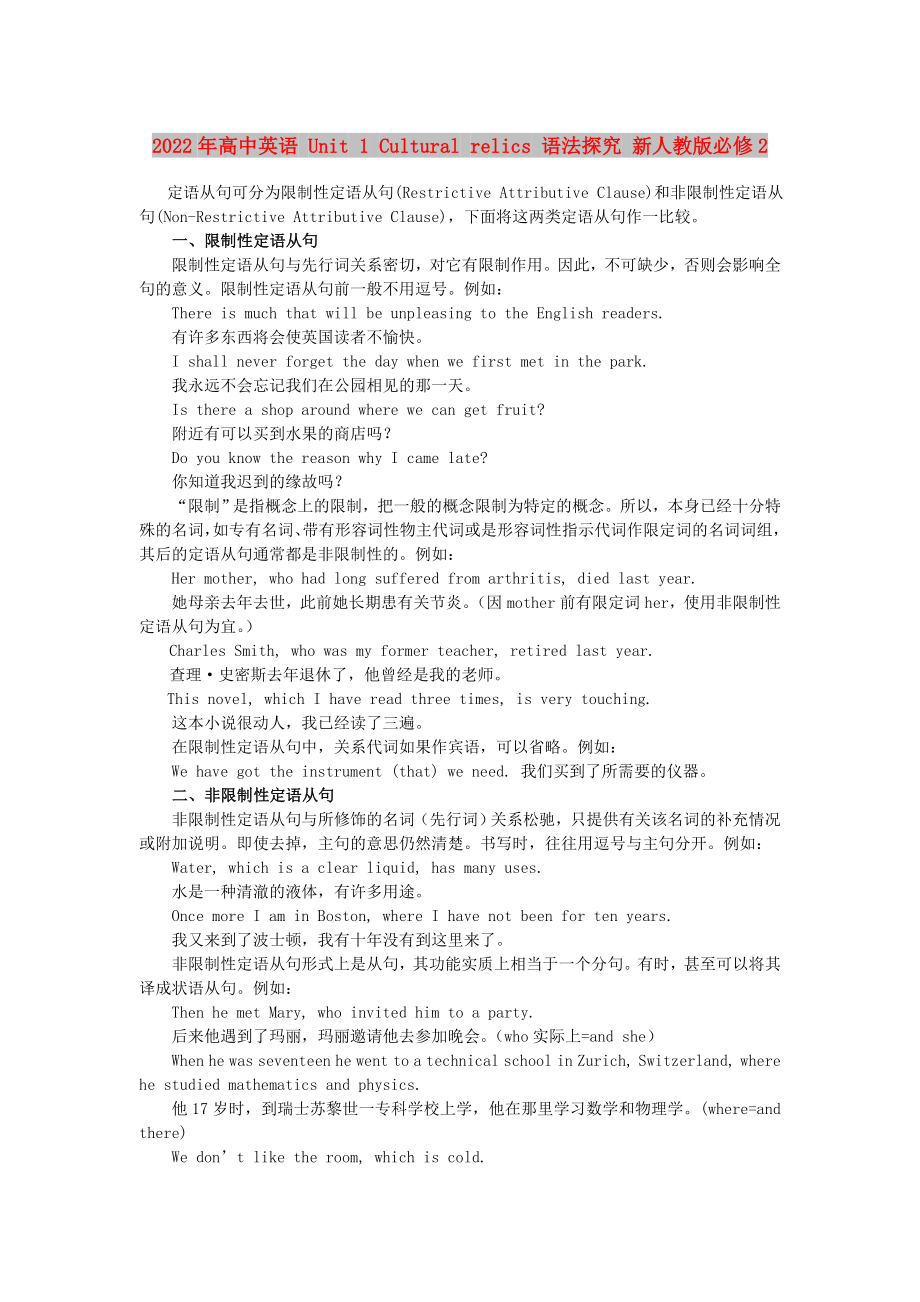《2022年高中英語(yǔ) Unit 1 Cultural relics 語(yǔ)法探究 新人教版必修2》由會(huì)員分享,可在線閱讀�,更多相關(guān)《2022年高中英語(yǔ) Unit 1 Cultural relics 語(yǔ)法探究 新人教版必修2(3頁(yè)珍藏版)》請(qǐng)?jiān)谘b配圖網(wǎng)上搜索。
1�、2022年高中英語(yǔ) Unit 1 Cultural relics 語(yǔ)法探究 新人教版必修2
定語(yǔ)從句可分為限制性定語(yǔ)從句(Restrictive Attributive Clause)和非限制性定語(yǔ)從句(Non-Restrictive Attributive Clause),下面將這兩類定語(yǔ)從句作一比較���。
一��、限制性定語(yǔ)從句
限制性定語(yǔ)從句與先行詞關(guān)系密切���,對(duì)它有限制作用����。因此���,不可缺少��,否則會(huì)影響全句的意義��。限制性定語(yǔ)從句前一般不用逗號(hào)��。例如:
There is much that will be unpleasing to the English readers.
有許多東西將會(huì)
2��、使英國(guó)讀者不愉快��。
I shall never forget the day when we first met in the park.
我永遠(yuǎn)不會(huì)忘記我們?cè)诠珗@相見(jiàn)的那一天��。
Is there a shop around where we can get fruit?
附近有可以買到水果的商店嗎��?
Do you know the reason why I came late?
你知道我遲到的緣故嗎�?
“限制”是指概念上的限制��,把一般的概念限制為特定的概念。所以��,本身已經(jīng)十分特殊的名詞�,如專有名詞、帶有形容詞性物主代詞或是形容詞性指示代詞作限定詞的名詞詞組��,其后的定語(yǔ)從句通常都
3���、是非限制性的��。例如:
Her mother, who had long suffered from arthritis, died last year.
她母親去年去世��,此前她長(zhǎng)期患有關(guān)節(jié)炎。(因mother前有限定詞her����,使用非限制性定語(yǔ)從句為宜。)
Charles Smith, who was my former teacher, retired last year.
查理·史密斯去年退休了����,他曾經(jīng)是我的老師。
This novel, which I have read three times, is very touching.
這本小說(shuō)很動(dòng)人�����,我已經(jīng)讀了三遍。
在限
4����、制性定語(yǔ)從句中,關(guān)系代詞如果作賓語(yǔ)�,可以省略。例如:
We have got the instrument (that) we need. 我們買到了所需要的儀器����。
二、非限制性定語(yǔ)從句
非限制性定語(yǔ)從句與所修飾的名詞(先行詞)關(guān)系松馳����,只提供有關(guān)該名詞的補(bǔ)充情況或附加說(shuō)明。即使去掉�,主句的意思仍然清楚。書(shū)寫(xiě)時(shí)����,往往用逗號(hào)與主句分開(kāi)。例如:
Water, which is a clear liquid, has many uses.
水是一種清澈的液體��,有許多用途��。
Once more I am in Boston, where I have not been for ten ye
5�����、ars.
我又來(lái)到了波士頓,我有十年沒(méi)有到這里來(lái)了�����。
非限制性定語(yǔ)從句形式上是從句��,其功能實(shí)質(zhì)上相當(dāng)于一個(gè)分句����。有時(shí),甚至可以將其譯成狀語(yǔ)從句���。例如:
Then he met Mary, who invited him to a party.
后來(lái)他遇到了瑪麗�,瑪麗邀請(qǐng)他去參加晚會(huì)����。(who實(shí)際上=and she)
When he was seventeen he went to a technical school in Zurich, Switzerland, where he studied mathematics and physics.
他17歲時(shí)�,到瑞士蘇黎世一專科學(xué)校
6�����、上學(xué),他在那里學(xué)習(xí)數(shù)學(xué)和物理學(xué)����。(where=and there)
We don’t like the room, which is cold.
我們不喜歡那個(gè)房間,它很冷�。(which is cold=since it is cold)
He said he was busy, which was untrue.
他說(shuō)他很忙,其實(shí)不然�。(which was untrue=though it was untrue)
We need him, who knows some English.
我們需要他,他懂些英語(yǔ)����。(who knows some English=for he kno
7、ws some English)
非限制性定語(yǔ)從句中的關(guān)系代詞不能省略���,that和why不可引導(dǎo)非限制性定語(yǔ)從句��。例如:
Wang Xin, whom Lao Li knows well, is our group leader.
王欣是我們的組長(zhǎng)����,小李對(duì)他很了解����。(該句中whom不可省略,亦不可為that取代)
which和as引導(dǎo)的非限制性定語(yǔ)從句可修飾整個(gè)主句或主句的一部分���,as從句還可置于主句之前�。例如:
He has to work on Sundays, which he doesn’t like.
他星期天得工作,這是他不喜歡的���。
As you know, the
8����、 work is very difficult.你們知道�����,這項(xiàng)工作很難�����。
which和whom在引導(dǎo)非限制性定語(yǔ)從句時(shí)常和of或其他介詞連用�。例如:
The buses, most of which were already full, were surrounded by an angry crowd. 公共汽車大部分都已滿載,周圍是一大群憤怒的人����。
Her sons, both of whom work abroad, ring her up every week.
她的兩個(gè)兒子都在國(guó)外工作���,每周都給她打電話��。
which引導(dǎo)非限制性定語(yǔ)從句有時(shí)可作定語(yǔ)��。例如:
Tom spe
9��、nt four years in college, during which time he learned French.
湯姆在大學(xué)待了四年�,在此期間他學(xué)了法語(yǔ)。
I may have to go into hospital, in which case I won’t be going on holiday. 我可能得住院����,如果那樣我就不去度假了。
As is known to all, the earth goes around the sun.
正如我們所知�,地球繞著太陽(yáng)轉(zhuǎn)。
as指代后面一句話的內(nèi)容�����,這時(shí)只能用as,因?yàn)閣hich引導(dǎo)的非限制性定語(yǔ)從句只能置于句末�,而
10、as引導(dǎo)的非限制性定語(yǔ)從句既可放在句末���,也可置于句中或句首��。如上面的句子還可以寫(xiě)作:
The earth, as we know, goes around the sun.
此外as在引導(dǎo)非限制性定語(yǔ)從句時(shí)��,有“正如�����、似”的含義�����,所以下列結(jié)構(gòu)中多用as:
as has been said above 如上所述 as anybody can see 正如人人所看到的那樣
as we had expected 正如我們所預(yù)料的那樣
[典例解析]
① He was much kinder to his youngest son th
11����、an to others,______, of course, made the others envy him.
A. who B. that C. what D. which
[解析]本題考查非限制性定語(yǔ)從句,先行詞是前面的整個(gè)句子����,which所引導(dǎo)的句子對(duì)前面主句起補(bǔ)充說(shuō)明作用。做題時(shí)��,先排除B.C兩項(xiàng)���,因?yàn)樗荒芤龑?dǎo)非限制性定語(yǔ)從句�,
而A項(xiàng)只能引導(dǎo)先行詞是人的定語(yǔ)從句����。
答案:D
② ______is known to everybody, the moon travels around the earth once every month.
A. It B. As C. That D. What
[解析]此題考查定語(yǔ)從句,放在句首只能用as�。若選A應(yīng)為:It is known to everybody
that the moon…
答案:B
 2022年高中英語(yǔ) Unit 1 Cultural relics 語(yǔ)法探究 新人教版必修2
2022年高中英語(yǔ) Unit 1 Cultural relics 語(yǔ)法探究 新人教版必修2

